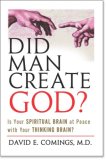The three great monotheistic religions represented a great leap forward in providing structure to the spirituality of man. All three provided a God that was the creator of man and the universe and a life long personal and spiritual companion. After death, as long as man followed certain well-defined moral rules, God also provided an eternal afterlife in heaven. This God was remarkably like man himself, both in appearance and personal qualities. Like man he was capable of love, hate, jealousy, anger, rage, and revenge. He judged, punished, created and destroyed. He was especially vengeful if man chose to worship idols. This all-knowing God was the symbol of transcendence – the essence of spirituality. This transcendence was so great that the true nature of God could only be known imperfectly and indirectly. There was an overt acceptance of the fact that reason and faith occupied separate worlds. The existence or non-existence of God was not open to knowing by reason. Knowledge of and acceptance of God was a matter of faith and religious experience. Reason was not welcome.
The wide diversity of man’s religions is in keeping with the statement that “Creating Gods is something that human beings have always done. When one religious idea ceases to work for them it is simply replaced.” The fact that the God of all three monotheistic religions so closely projected the needs, fears, desires and even appearance of man, is consistent with the probability that not only the religions, but God, the object of the religion – was created by man. [p531]
